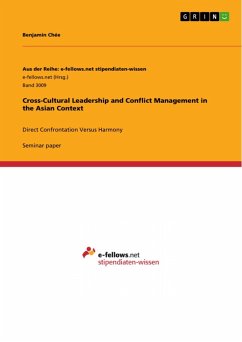Seminar paper from the year 2017 in the subject Communications - Intercultural Communication, grade: 1,3, Hong Kong Polytechnic University, language: English, abstract: In order to find out solutions for leadership and communication conflicts of Western expatriates in Asia, this paper examines cultural characteristics of the Asian, as well as Western, leader-follower construct and how miscommunication could occur. Furthermore, expected leadership styles are explained and which leadership traits and behaviors are desirable from the Asian point of view. Finally, improvement approaches for better cross-cultural conflict management and expatriate leadership in Asia are discussed, while pointing out their limitations. In an increasingly globalized world, it is more and more common to work in intercultural teams with intercultural leaders. This paper is about the problems that arise when leadership is not meeting the expectations in a particular culture and when conflicts are not managed with regard to the cultural backgrounds. Asian societies tend to be collectivist cultures, where conflicts are usually avoided and where harmony is the ultimate goal. In Western societies, conflict resolution is usually characterized by direct confrontation. Expectations to a leader also differ: In Asian societies, a paternalistic leadership approach seems to be more common, whereas in Western societies a participative leadership style is used. Awareness is the first step of a successful cross-cultural cooperation, but it does not give instructions how to act in a certain situation.
Dieser Download kann aus rechtlichen Gründen nur mit Rechnungsadresse in A, B, BG, CY, CZ, D, DK, EW, E, FIN, F, GR, HR, H, IRL, I, LT, L, LR, M, NL, PL, P, R, S, SLO, SK ausgeliefert werden.









